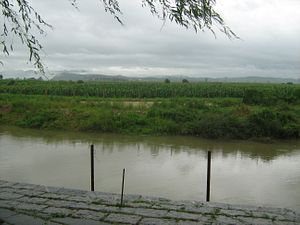Earlier this week, a North Korean army deserter killed four people in the Chinese border city of Helong. China has issued a formal protest with Pyongyang over the incident, which adds to the list of evidence that China and North Korea are not as close as they once were. The deserter was arrested just north of the Tumen River, which creates a natural demarcation between North Korean and Chinese territory, and is commonly crossed by North Korean defectors. Chinese foreign ministry spokesman Hong Lei confirmed that the suspect had been shot while attempting to flee and “died later after medical treatment failed to revive him.”
So far, the Chinese foreign ministry has revealed few details about the incident itself and the nature of China’s protest to Pyongyang. A statement by a Chinese foreign ministry spokesperson noted that “China’s public security bureau will handle the case according to law.”
The insecurity of China’s border with North Korea remains a concern for Beijing, which is wary of inflowing deserters. Analysts suspect that Beijing has extensively planned for a crisis scenario where the North Korean regime collapses and thousands upon thousands of deserters potentially try to enter China illegally. China’s border with North Korea is not as secure as the highly dangerous demilitarized zone (DMZ) between South and North Korea. Many North Korean defectors have successfully entered China via the Tumen River and elsewhere along the porous border. Helong, the city where the incident occurred, is on the northeastern end of the China-North Korea border.
As various Diplomat authors repeatedly noted over the course of 2014, relations between North Korea and China appear to grow more frigid with time. The first major indication that Pyongyang was starting to grow distant from Beijing came with the execution of regime number two and Kim Jong-un’s uncle, Jang Song-thaek. Jang had long been the main interlocutor between Beijing and Pyongyang, particularly on economic matters. Following Jang’s execution, later reports showed that North Korean military propaganda had started using negative terms to describe China, including calling Beijing a “turncoat” and North Korea’s “enemy.”
Last year, the Kim regime also stepped up its diplomacy with Moscow and even Japan (on the issue of Japanese abductees). North Korea and China, however, have given no explicit signals that their relationship is truly broken. Beijing, for example, recently stood with Russia at the United Nations Security Council in voting against the question of referring North Korea’s human rights record to the International Criminal Court for prosecution.
It remains to be seen if this will be the last we hear of this incident in major media outlets. North Korea and China will likely resort to diplomatic channels to resolve the issue. Most reports suggest that North Korea under Kim Jong-un has ramped up its border security to the north to prevent defections. China generally repatriates any caught defectors back to North Korea. The death of the deserted in this case allows both Beijing and Pyongyang to avoid the tricky question of repatriation of a North Korean national accused of murdering Chinese citizens.

































